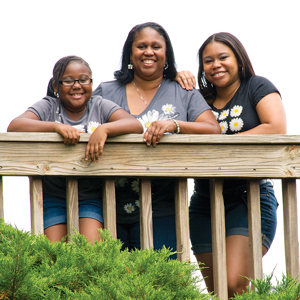This June marked two years. But a loss so profound can feel like just yesterday sometimes for Kelly Jackson, who found her husband on a summer Tuesday morning, lying on the floor in the guest bedroom. “Something told me he was gone,” she remembers. Sean Jackson was forty-one when complications from unexplained seizures took him from his family, leaving Kelly and their two young daughters reeling to process their emotions.
Experts tell us that grief is neither linear nor predictable, and Kelly Jackson watched this play out in different ways with her girls, then ages five and fourteen. “Kaela is the oldest; she is a daddy’s girl,” Jackson says. “They watched every show together, they both liked music.” Kaela’s grief vented itself verbally – in crying fits and talking about her father. But Kyndall bottled up her sadness, refusing to talk and instead lashed out with unpredictable anger at home and at school.
Then Jackson’s aunt, a close family member, passed away. Suddenly the girls were dealing with back-to-back losses. “I figured somehow that I would be okay,” Jackson says. “My biggest concern was them.” She started exploring options for therapy, and a counselor recommended Comfort Zone Camp.
About four percent of children in Western countries suffer the death of a parent, according to a 2008 study in the Journal of American Medicine. Those children, the study found, are at higher risk for depression and post-traumatic stress disorder. Grief experts agree that talking about loss can eventually lessen its painful power, but children experiencing grief often reject counseling and other attempts at formal and informal talk therapy. Comfort Zone’s creative solution: a typical summer camp setting with built-in, child-focused grief support.
Comfort Zone Camp is celebrating its fifteenth anniversary this year. It held the first camp in 1999 in Richmond to give children who have lost a parent or a sibling a safe place to have fun and open up to others – sharing and connecting with trained grief counselors and peers as well. Kids ages seven to seventeen are divided into age groups that meet for Healing Circle group support sessions (there are parent sessions as well). Each camper, or Little Buddy, is paired one-on-one with a Big Buddy counselor or returning camper. Campers have the option to return each year, and all Comfort Zone sessions are free of charge.
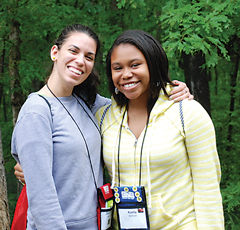 “We mix the therapy in, so it’s something that’s fun,” says Mary Beth McIntyre, Comfort Zone’s CEO. Campers aren’t allowed to have cell phones or other electronics, so they can focus on connecting in person. “The typical camp weekend has high-energy fun, and then transitions into some work, some group therapy,” McIntyre explains. “The kids come out of that and go into another high-energy activity. So it matches a child’s natural rhythm during the day.”
“We mix the therapy in, so it’s something that’s fun,” says Mary Beth McIntyre, Comfort Zone’s CEO. Campers aren’t allowed to have cell phones or other electronics, so they can focus on connecting in person. “The typical camp weekend has high-energy fun, and then transitions into some work, some group therapy,” McIntyre explains. “The kids come out of that and go into another high-energy activity. So it matches a child’s natural rhythm during the day.”
The notion of bereavement camp didn’t appeal at all to Kyndall and Kaela Jackson. “It sounded like I would just be sad and moping and crying all weekend,” Kaela says. The girls initially refused to go, but Mom insisted. “I told them it was okay to get help, and that we were doing this as a family,” Kelly says. They signed up for an initial family session to determine if the girls liked it enough to attend the full three-day kids’ camp later.
McIntyre says that this trepidation is typical for Comfort Zone campers, who are often withdrawn or angry, and sometimes forced by concerned parents to attend camp. “The key to making all this work is our matching process,” she says. “We match every child one on one with a trained volunteer. We have an intense intake process in which the coordinator reaches out to talk to the child’s family, doctor, therapist or school teacher, all the touch-points surrounding the child to help us really get to know what they are struggling with and what their strengths are.” Nobody can erase the pain of profound loss, but Comfort Zone’s goal is to teach kids that they have the internal strength to survive.
When Kelly’s girls got back into the car after their first Comfort Zone group session, she knew she had been right to push them to attend. “Kyndall couldn’t wait to go back again. She opened up and shared her story, and she wouldn’t even do that with me,” Jackson says. “Kaela was like, ‘It’s the best thing, and I really enjoyed it.’ Everybody was happy.” Jackson signed on primarily to help her children, but she found support as well. “Comfort Zone made you feel it was okay to grieve, okay to cry whenever you felt like crying. It gave you a place to talk to people going through the same thing.” There was no question that the family would return. Kaela attended her first camp last May, and Kyndall attended this summer.
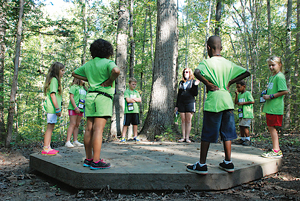 Comfort Zone Camp got its start in Richmond, and has since launched camps in New York and New Jersey, Boston, Chicago, and California.
Comfort Zone Camp got its start in Richmond, and has since launched camps in New York and New Jersey, Boston, Chicago, and California.
Comfort Zone expanded nationally in 2001, after responding to the massive losses following the September 11 terrorist attacks in New York. “That work was pretty visible so it attracted attention from volunteers across the country,” McIntyre says. “There were so many children dealing with losses of parents and siblings, it really rose to a high awareness level.” Comfort Zone held their traditional three-day camps in New York and New Jersey, with Boston, Chicago, and California quickly following. Camps are also available now in Raleigh and Virginia Beach.
In addition to expanding geographically, Comfort Zone is also testing partnerships with specialized service organizations that focus on particular types of loss. They hold a one-day program in Chicago in partnership with the Sheilah A. Doyle Foundation, which focuses on supporting children who have lost a parent or sibling to homicide. And in Boston, Comfort Zone works with both the Department of Public Health and the Samaritans to hold a camp for children who have lost a parent to suicide.
“It wasn’t what I expected; it was a lot better,” says Kaela about Comfort Zone. Initially, she was concerned the stay would be about “sad moping all weekend.”
“These camps are very powerful because you’re not only breaking down barriers on the loss, but it’s the type of loss,” says McIntyre. “Those losses can have stigmas and the children can be more hesitant to open up. Children will often kind of ‘grade’ their loss. So, a child whose parent committed suicide may be hesitant to share because they’re not sure the other kids in the circle are ready to hear that yet.”
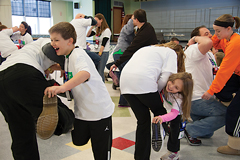 To encourage sharing and connecting, one of Comfort Zone’s most powerful assets is the counselors who return year after year. “They are great role models for new campers,” McIntyre says. “They usually open up first and share first. And it’s also confidence-building for them because they see they can help another camper, and there’s no better healing than that.” After her first weekend, Kaela Jackson knew she would volunteer.
To encourage sharing and connecting, one of Comfort Zone’s most powerful assets is the counselors who return year after year. “They are great role models for new campers,” McIntyre says. “They usually open up first and share first. And it’s also confidence-building for them because they see they can help another camper, and there’s no better healing than that.” After her first weekend, Kaela Jackson knew she would volunteer.
“It wasn’t what I expected; it was a lot better,” Kaela says. “There were moments when people shared stories and it got emotional, but it wasn’t sad moping all weekend. It was about making connections.” Now, as a returning camper, Kaela is one of those connections. Camp administrators asked her to speak about her experience at a fundraising event last year, and although she had never been much of a public speaker, her passion for the subject inspired her. Since then she has become something of an unofficial spokesperson, speaking at business meetings and fundraisers, and appearing in a camp video.
“I think it’s great to get the message out about grief from someone who’s not necessarily an adult,” Kaela says. “Sometimes adults don’t understand how kids are grieving. Kids my age often aren’t open to talk. I’m open, I’m able to talk so I’m speaking for other kids who are going through what I’m going through and we can get the right help.”
Kelly Jackson has watched her older daughter transform her grief into a source of strength. “Most kids would be ashamed to tell people ‘I’m in counseling, I go to Comfort Zone,’ but she’s proud of it. She talks to even little kids, and her goal for Girl Scouts is to work with kids who have lost parents.” Formerly shy Kaela has transformed into a confident public speaker in school project presentations. Comfort Zone has helped Kaela and her family not only survive, but thrive.
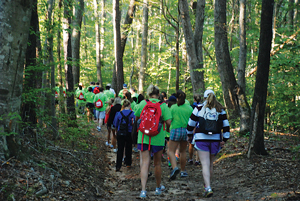
When Battling Cancer in the Family
Knocks Kids Flat, There’s Camp Kesem
Richmond is home to another bereavement support group for kids. It’s called Camp Kesem. The national organization is based at universities across the country, each of which organizes and fund-raises for its camps. The University of Richmond chapter was founded in 2009, and Virginia Commonwealth University is starting one this year.
The week-long, free summer camps aim to support the over three million children with a parent who is currently battling cancer, in remission from cancer, or has passed away from cancer. “Kids whose parents have cancer are the silent victims,” says Jenny Holmgrain, the VCU student launching the new Kesem chapter. “They are shuttled to doctor appointments, and they feel the sadness in their daily lives. It can be hard for their friends to understand.” Holmgrain and her younger sister lost their father in 2009 to lung cancer, and although Holmgrain was too old to attend, her sister spent a week at a Camp Kesem chapter in D.C. “She came back a much different kid, laughing and joking around,” Holmgrain says. “And the counselors were having fun too. When the opportunity presented itself to open a chapter here, I definitely wanted to do it.”
Much like Comfort Zone Camp, Camp Kesem helps build a peer-support network for campers to offer them lifelong friendship and support. At VCU, Jenny is busy fundraising for this summer’s first camp, and also accepting applications for the first thirty campers at campkesem.org.


